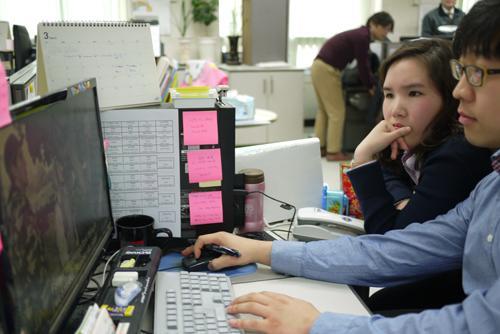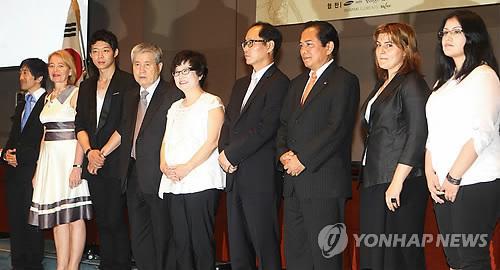Community
Press
[PRESS RELEASE] [2012] The Korea Herald Coverage of the SDA Organizing Committee
- Admin
- 2013-02-14
- Views 33,082
Korea’s international awards show highlights best in TV dramas
2012-04-15 20:10

Park Eun-mi (left) screens submissions for the 2012 Seoul International Drama Awards. (Yonhap News)
Park Eun-mi has been watching TV almost all day for months. As a television programmer, she is among those responsible for sifting through scores of submissions to a list of candidates for the Seoul International Drama Awards.
Now in its seventh year, the awards ceremony recognizing the best in television dramas will be held in August in South Korea, a country increasingly known worldwide for producing top-notch programming.
“It is our way of giving back,” said Min Young-dong, last year’s producer of the awards show. “The rest of the world enjoys our Korean dramas so much, that we feel like we should give back to the industry and hand out awards for their shows as well.”
Korean dramas are what started “hallyu,” or the Korean Wave, as viewers, first in Asia and then across the globe, tuned in. Popular Korean actors and actresses now clinch starring roles in shows produced in other countries. The Korean-language productions are also winning recognition in some previously unimaginable places, like “Dream High,” a story about students at a performing arts high school, being nominated in Switzerland’s Rose d’Or global television festival in February.

Participants at the Seoul International Drama Awards pose for a picture ahead of a press conference at the 2011 event. (Yonhap News)
The Seoul Drama Awards Organization launched the annual ceremony in 2006 when there were no such awards shows in Asia.
Giving back to the international drama community is an active goal of the SDAO. Three times a year they put on a free screening in Seoul of a made-for-TV drama from a different country as a way to try and promote programs from other parts of the world.
Television programmer Park, who describes her job as “interesting,” has a rather tight schedule. “We start receiving submissions in January and must have our preliminary selections ready by the end of May,” she said. “Mostly, we are looking for top-notch quality programs.”
This large catalog of shows is then shown to a group of 12 Korean judges for the first round of judging. After selecting the nominees, the final dramas are shown to the international judges, scored, and the winners are then selected. Park and her team of programmers have already began pre-screening productions from abroad, and filtered out those that are not up to the standard of quality the organization is trying to highlight.
One prerequisite the studios outside of Korea must abide by when submitting a show is to include English subtitles.
The goal is to get anywhere from 150-200 submissions within the next few months. As the show has gained in popularity amongst studios abroad, shows are submitted directly as opposed to years past when the SDAO would have to hunt down submissions. For the 2011 awards, 204 dramas from 37 countries, including first timers Mongolia and Romania, were entered, nearly double the amount from the inaugural year.
The international aspect of the awards show is the very reason it has separated itself from other festivals or awards shows in Asia. Organizers are adamant about having overseas judges play an active role in the process. The SDAO receives recommendations for judges from awards festivals in other countries like the Banff World Media Festival in Canada and WorldFest-Houston in Texas.
The team is also determined to get the award nominees from other countries to come to Korea. Organizers say cast members, directors and producers of foreign shows are eager to make an appearance at the event. For example, in 2009, the director of the popular criminal procedural series, “CSI,” accepted their invitation.
“He was very overwhelmed,” said Min, who produced last year’s show. “He simply did not expect that kind of popularity in Korea.”
For last year’s winner of the Golden Bird Award for best made-for-TV movie, “Shades of Happiness,” winning the award in South Korea was especially significant.
“I’m very moved by this because our film deals with a time when Germany was still a divided country. So, I am very moved to receive this movie award here in South Korea,” the movie’s director, Miguel Alexandre, said at the awards show.
The show’s popularity has yet to catch on in Korea, however.
Last year’s event drew criticism for its lack of professional translators and omitted preparation details. Koreans who are already hooked on their homegrown dramas have not yet embraced foreign productions, organizers say, while the show records high ratings in countries like Japan and China.
The actual taping of the show will be broadcast live in Korea on Aug. 20 this year and later distributed to different countries around Asia.
(Yonhap News)
- Prev[PRESS RELEASE] [2013] Online voting for People`s Choice, Outstanding Korean Drama Prize, Outstanding Korean Drama OST
- Next[PRESS RELEASE] [2013] Press Release - 8th Awards Ceremony & Call for Entries
[PRESS RELEASE] [2012] The Korea Herald Coverage of the SDA Organizing Committee
- Admin
- 2013-02-14
- Views 33,082
Korea’s international awards show highlights best in TV dramas
2012-04-15 20:10
 |
| Park Eun-mi (left) screens submissions for the 2012 Seoul International Drama Awards. (Yonhap News) |
Now in its seventh year, the awards ceremony recognizing the best in television dramas will be held in August in South Korea, a country increasingly known worldwide for producing top-notch programming.
“It is our way of giving back,” said Min Young-dong, last year’s producer of the awards show. “The rest of the world enjoys our Korean dramas so much, that we feel like we should give back to the industry and hand out awards for their shows as well.”
Korean dramas are what started “hallyu,” or the Korean Wave, as viewers, first in Asia and then across the globe, tuned in. Popular Korean actors and actresses now clinch starring roles in shows produced in other countries. The Korean-language productions are also winning recognition in some previously unimaginable places, like “Dream High,” a story about students at a performing arts high school, being nominated in Switzerland’s Rose d’Or global television festival in February.
 |
| Participants at the Seoul International Drama Awards pose for a picture ahead of a press conference at the 2011 event. (Yonhap News) |
The Seoul Drama Awards Organization launched the annual ceremony in 2006 when there were no such awards shows in Asia.
Giving back to the international drama community is an active goal of the SDAO. Three times a year they put on a free screening in Seoul of a made-for-TV drama from a different country as a way to try and promote programs from other parts of the world.
Television programmer Park, who describes her job as “interesting,” has a rather tight schedule. “We start receiving submissions in January and must have our preliminary selections ready by the end of May,” she said. “Mostly, we are looking for top-notch quality programs.”
This large catalog of shows is then shown to a group of 12 Korean judges for the first round of judging. After selecting the nominees, the final dramas are shown to the international judges, scored, and the winners are then selected. Park and her team of programmers have already began pre-screening productions from abroad, and filtered out those that are not up to the standard of quality the organization is trying to highlight.
One prerequisite the studios outside of Korea must abide by when submitting a show is to include English subtitles.
The goal is to get anywhere from 150-200 submissions within the next few months. As the show has gained in popularity amongst studios abroad, shows are submitted directly as opposed to years past when the SDAO would have to hunt down submissions. For the 2011 awards, 204 dramas from 37 countries, including first timers Mongolia and Romania, were entered, nearly double the amount from the inaugural year.
The international aspect of the awards show is the very reason it has separated itself from other festivals or awards shows in Asia. Organizers are adamant about having overseas judges play an active role in the process. The SDAO receives recommendations for judges from awards festivals in other countries like the Banff World Media Festival in Canada and WorldFest-Houston in Texas.
The team is also determined to get the award nominees from other countries to come to Korea. Organizers say cast members, directors and producers of foreign shows are eager to make an appearance at the event. For example, in 2009, the director of the popular criminal procedural series, “CSI,” accepted their invitation.
“He was very overwhelmed,” said Min, who produced last year’s show. “He simply did not expect that kind of popularity in Korea.”
For last year’s winner of the Golden Bird Award for best made-for-TV movie, “Shades of Happiness,” winning the award in South Korea was especially significant.
“I’m very moved by this because our film deals with a time when Germany was still a divided country. So, I am very moved to receive this movie award here in South Korea,” the movie’s director, Miguel Alexandre, said at the awards show.
The show’s popularity has yet to catch on in Korea, however.
Last year’s event drew criticism for its lack of professional translators and omitted preparation details. Koreans who are already hooked on their homegrown dramas have not yet embraced foreign productions, organizers say, while the show records high ratings in countries like Japan and China.
The actual taping of the show will be broadcast live in Korea on Aug. 20 this year and later distributed to different countries around Asia.
(Yonhap News)
- Prev[PRESS RELEASE] [2013] Online voting for People`s Choice, Outstanding Korean Drama Prize, Outstanding Korean Drama OST
- Next[PRESS RELEASE] [2013] Press Release - 8th Awards Ceremony & Call for Entries
